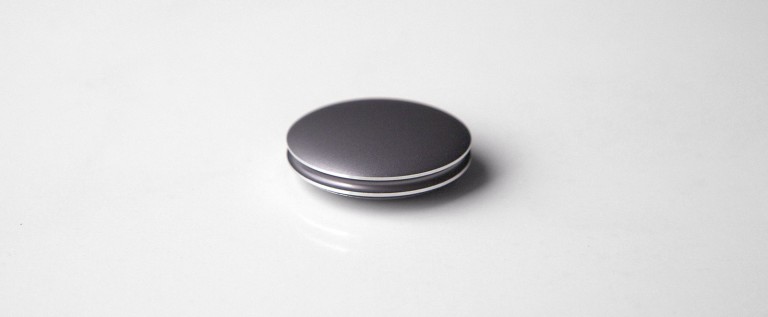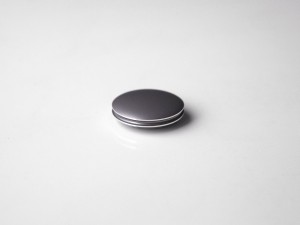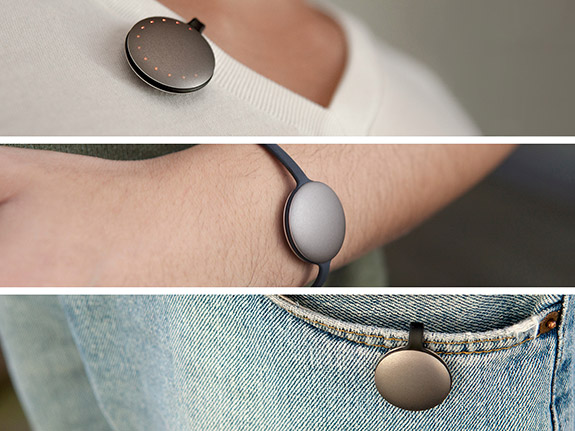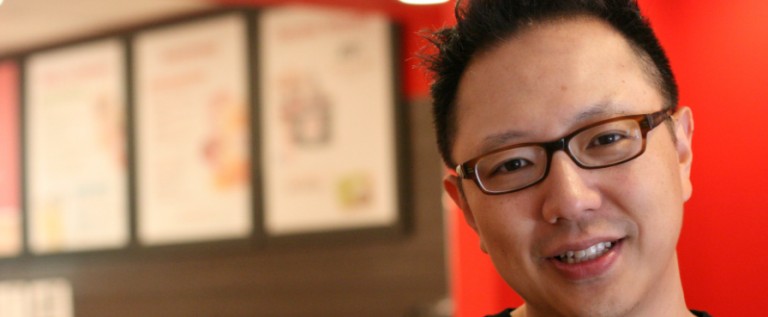Misfit Shine aims for FitBit, confirms Asian Americans rule fitness tracking

Question. What happens when Apple heritage mixes with the current trend of wearable, measurable fitness gadgets? The answer is far more creative than a Nike+ dongle.
The answer is Misfit Wearables–the company that is making big splashes in startup and crowdfunding circles. The Shine, a quarter-sized, UFO-eque device that clips onto a bundled wrist band or any other article of clothing, is Misfit Wearables’ first product. The device syncs to phones and tablets using an innovative process that triggers when the device is placed on the screen. No cables, NFC (Near Field Communication), or Bluetooth involved. Unlike the Fitbit products, the Jawbone Up, or the Nike FuelBand, Misfit wants you to forget about their product. Instead of making flashy, fashionable accessories, the Misfit Shine looks like a glorified shirt button. On the plus side, the device is classy enough to wear in the office and won’t distract you with discomforting lights and sounds. Imagine pitching to a roomful of executives while your FuelBand announces the embarrassing number of calories you’ve burned that day. Conversely, the flashier products remind you with their presence throughout the day that you’re in fitness mode. Misfit’s offering is so small and natural looking that you might forget the purpose of it and just throw it in the laundry with the rest of your flamboyantly-buttoned shirts. Fortunately, the company seems to have thought that out. The Shine lights up on demand to display your daily goal completion, is waterproof, and will come with either a sport or leather wristband for high profile use.
Misfit Wearables is certainly a startup with lots of hype, underscored by the fact that they’ve already doubled their Indiegogo goal with 35 days left. But the product is only half of the magic at the company. The company is stressing what CEO Sonny Vu calls “The Lean Hardware Movement.” His philosophy breaks from the traditional “if you build it, they will come” attitude and further stresses the importance of the crowd. “In keeping with our philosophy of thoughtful simplicity, we’re trying to simplify the process of making stuff. That means we run a tight ship with a small team,” says Vu. But don’t let that fool you. The company is growing, with at least nine job posting on their website at the time of this writing. As part of the lean hardware movement, Vu also stresses the importance of introducing products through sites like Indiegogo to prove demand through crowdfunding. Not all Bay Area companies subscribe to the Steve Jobs belief that consumers have no idea what they want.
That may be the most significant trait which Misfit Wearables rejected from Apple. That Apple heritage we mentioned earlier? In addition to Vu and the co-founder of his previous startup, Sridhar Iyengar, Misfit Wearables’ other founder is none other than John Sculley, the infamous former CEO of Apple. Even the name Misfit Wearables was Apple-inspired, according to TechCrunch. The founders toyed with a few mundane names before recalling Apple’s legendary “Think Different” commercial: “Here’s to the crazy ones. The misfits. The rebels. The troublemakers.” And the other startup from Vu and Iyengar? It’s called Agamatrix and developed the first medical device that Apple and the FDA ever approved for the iPhone.
The introduction of Misfit Shine further solidifies the role of Asian Americans and the growing trend in fitness tracking startups. In addition to Vu and Iyengar, Fitbit’s CEO, James Park, is a Korean American serial entrepreneur. Gympact, Fitocracy, Bitgym, and Basis are all fitness startups with Asian Americans in key positions. With over $23 million in funding for Fitbit and nearly $8 million for Misfit Wearables and $1 million for GymPact, the fitness craze is here to stay.






